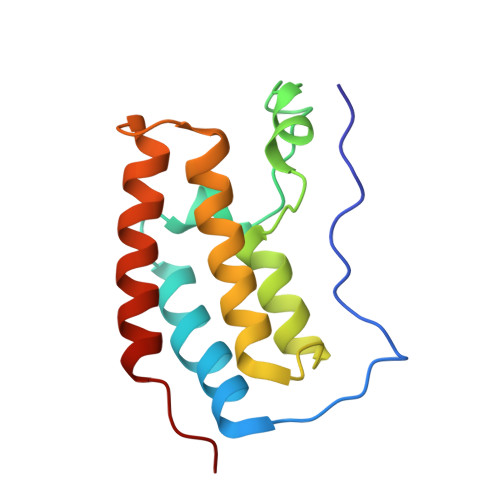Autism-Like Syndrome is Induced by Pharmacological Suppression of Bet Proteins in Young Mice.
Sullivan, J.M., Badimon, A., Schaefer, U., Ayata, P., Gray, J., Chung, C., Von Schimmelmann, M., Zhang, F., Garton, N., Smithers, N., Lewis, H., Tarakhovsky, A., Prinjha, R.K., Schaefer, A.(2015) J Exp Med 212: 1771
- PubMed: 26392221
- DOI: https://doi.org/10.1084/jem.20151271
- Primary Citation of Related Structures:
5ACY - PubMed Abstract:
Studies investigating the causes of autism spectrum disorder (ASD) point to genetic, as well as epigenetic, mechanisms of the disease. Identification of epigenetic processes that contribute to ASD development and progression is of major importance and may lead to the development of novel therapeutic strategies. Here, we identify the bromodomain and extraterminal domain-containing proteins (BETs) as epigenetic regulators of genes involved in ASD-like behaviors in mice. We found that the pharmacological suppression of BET proteins in the brain of young mice, by the novel, highly specific, brain-permeable inhibitor I-BET858 leads to selective suppression of neuronal gene expression followed by the development of an autism-like syndrome. Many of the I-BET858-affected genes have been linked to ASD in humans, thus suggesting the key role of the BET-controlled gene network in the disorder. Our studies suggest that environmental factors controlling BET proteins or their target genes may contribute to the epigenetic mechanism of ASD.
Organizational Affiliation:
Department of Neuroscience and Department of Psychiatry, Friedman Brain Institute, Icahn School of Medicine at Mount Sinai, New York, NY 10029 Department of Neuroscience and Department of Psychiatry, Friedman Brain Institute, Icahn School of Medicine at Mount Sinai, New York, NY 10029.
















